北师大版英语必修一模块1 Unit 2 Heroes 现在完成时课件(共34张)
文档属性
| 名称 | 北师大版英语必修一模块1 Unit 2 Heroes 现在完成时课件(共34张) |

|
|
| 格式 | zip | ||
| 文件大小 | 189.9KB | ||
| 资源类型 | 教案 | ||
| 版本资源 | 北师大版 | ||
| 科目 | 英语 | ||
| 更新时间 | 2017-10-25 00:00:00 | ||
图片预览

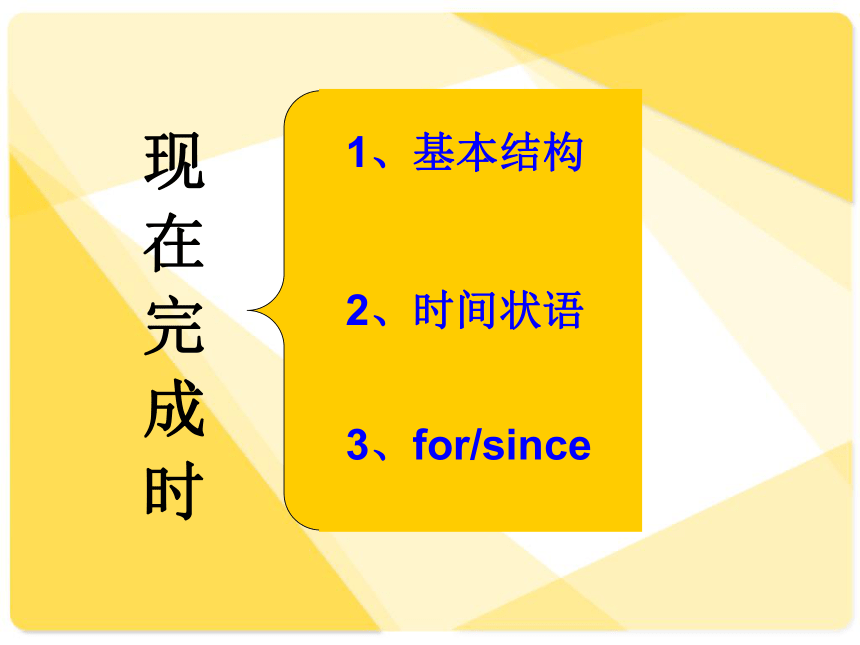
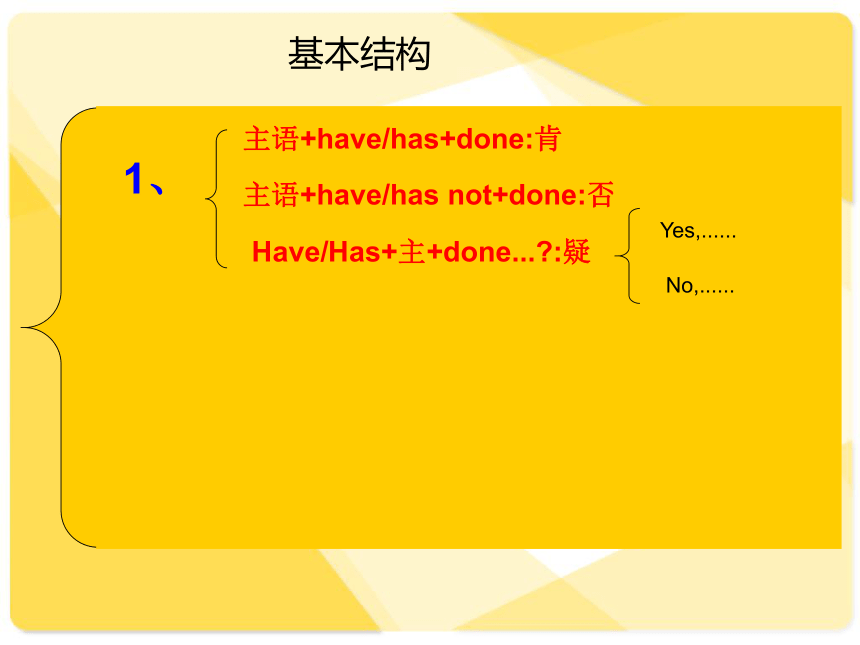
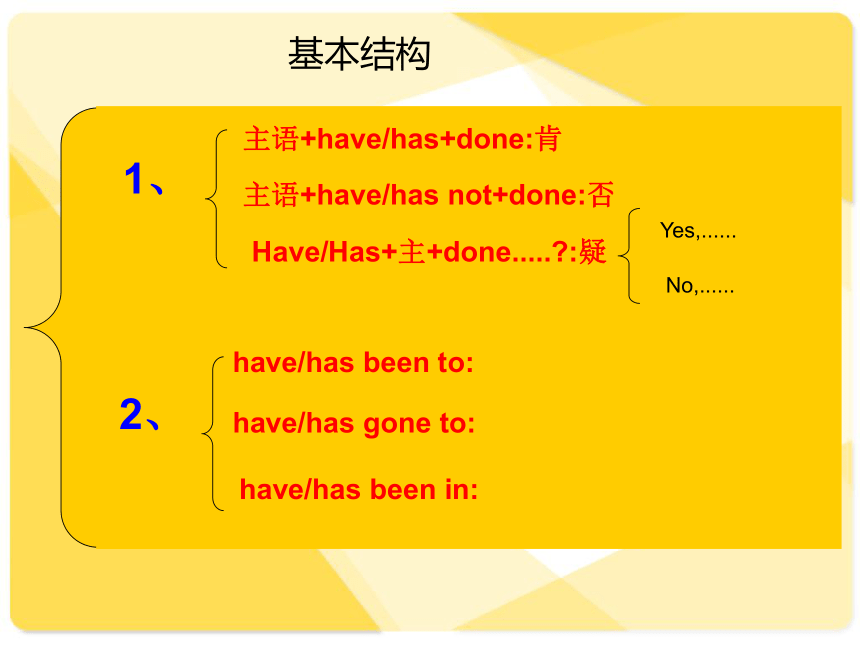

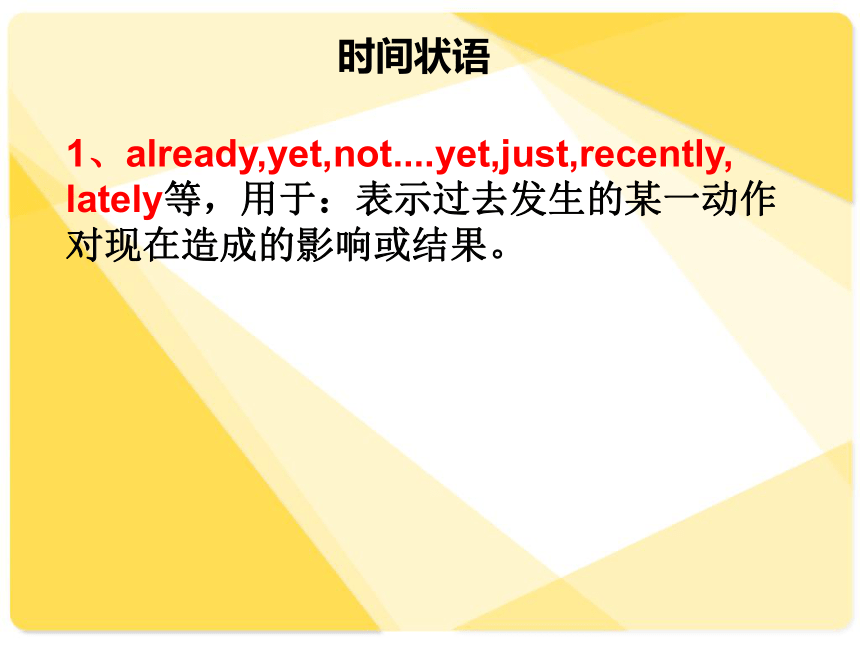

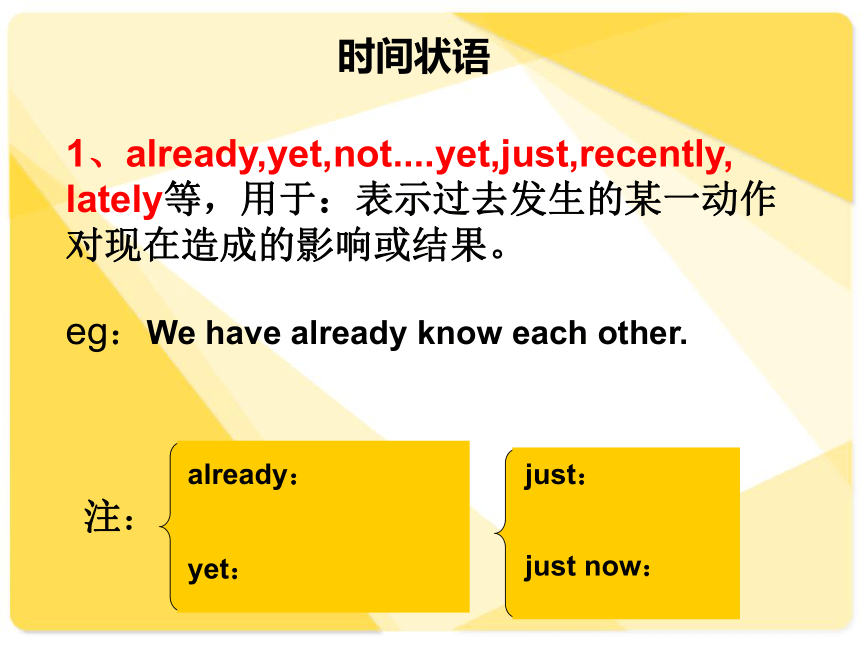
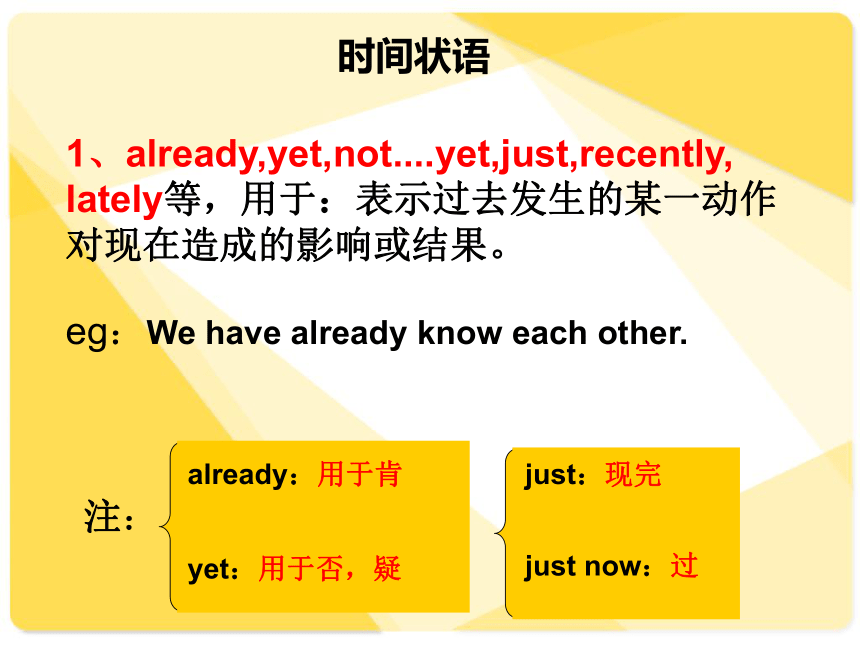



文档简介
课件34张PPT。现在完成时现 在 完 成 时1、基本结构2、时间状语3、for/since基本结构1、主语+have/has+done:肯主语+have/has not+done:否 Have/Has+主+done...?:疑 Yes,......No,......基本结构1、2、主语+have/has+done:肯主语+have/has not+done:否 Have/Has+主+done.....?:疑 Yes,......No,......have/has been to:have/has gone to:have/has been in:基本结构1、2、主语+have/has+done:肯主语+have/has not+done:否 Have/Has+主+done.....?:疑 Yes,......No,......have/has been to:去过某地(现在在这)have/has gone to:去了某地(现在不在这)have/has been in:现在在某地时间状语1、already,yet,not....yet,just,recently,
lately等,用于:表示过去发生的某一动作对现在造成的影响或结果。时间状语1、already,yet,not....yet,just,recently,
lately等,用于:表示过去发生的某一动作对现在造成的影响或结果。eg:We have already know each other.时间状语1、already,yet,not....yet,just,recently,
lately等,用于:表示过去发生的某一动作对现在造成的影响或结果。eg:We have already know each other.注:already:yet:just:just now:时间状语1、already,yet,not....yet,just,recently,
lately等,用于:表示过去发生的某一动作对现在造成的影响或结果。eg:We have already know each other.注:already:用于肯yet:用于否,疑just:现完just now:过时间状语2、never,ever,once,twice,three times...,before等,用于:表示说话之前发生过的动作,这种动作可能发生过一次,也可能发生过多次。时间状语2、never,ever,once,twice,three times...,before等,用于:表示说话之前发生过的动作,这种动作可能发生过一次,也可能发生过多次。eg: I have never been to Tibet. 时间状语2、never,ever,once,twice,three times...,before等,用于:表示说话之前发生过的动作,这种动作可能发生过一次,也可能发生过多次。eg: I have never been to Tibet. She has made the same mistakes many times.时间状语2、never,ever,once,twice,three times...,before等,用于:表示说话之前发生过的动作,这种动作可能发生过一次,也可能发生过多次。eg: I have never been to Tibet. She has made the same mistakes many times.提问词how many times
例: —Look! Somebody____the sofa.
—Well, it wasn't me.I didn't do it.
A. is cleaning B.was cleaning
C. has cleaned D. had cleaned时间状语
例: —Look! Somebody____the sofa.
—Well, it wasn't me.I didn't do it.
A. is cleaning B.was cleaning
C. has cleaned D. had cleaned3. 其他常用于现在完成时的时间状语:
so far, in the past/last few years,
by the time+现在时态
It/This is the first/second...time+现在完成时
eg:I haven't completed my task so far,
This is the second time I have been here时间状语 for/since
for/since用于:表示动作发生在过去,持续到现在,也可能继续持续下去
for/since
for/since用于:表示动作发生在过去,持续到现在,也可能继续持续下去
since+ 1、时间点:two years ago,in 2008 2、It is/has been+一段时间+since(过去式)从句 for/since
for/since用于:表示动作发生在过去,持续到现在,也可能继续持续下去
since+ 1、时间点:two years ago,in 2008 2、It is/has been+一段时间+since(过去式)从句 for+ 时间段:two years, twelve months
for/since
for/since用于:表示动作发生在过去,持续到现在,也可能继续持续下去
since+ 1、时间点:two years ago,in 2008 2、It is/has been+一段时间+since(过去式)从句 for +提问词 时间段:two years, twelve months
for/since
for/since用于:表示动作发生在过去,持续到现在,也可能继续持续下去
since+ 1、时间点:two years ago,in 2008 2、It is/has been+一段时间+since(过去式)从句 for +提问词how long 时间段:two years, twelve months
for/since
for/since用于:表示动作发生在过去,持续到现在,也可能继续持续下去
since+ 1、时间点:two years ago,in 2008 2、It is/has been+一段时间+since(过去式)从句 for +提问词how long 时间段:two years, twelve months
eg:My grandmother has been ill since two days ago It's a long time since I met you last time
We have studied English for more than six years
例: —How long___Professor White___the book?
—For about 10 days.
A. was; keeping B.has; borrowed
C. has; kept D. did; borrow.
for/since
例: —How long___Professor White___the book?
—For about 10 days.
A. was; keeping B.has; borrowed
C. has; kept D. did; borrow.
for/since
例: —How long___Professor White___the book?
—For about 10 days.
A. was; keeping B.has; borrowed
C. has; kept D. did; borrow.
注:非延续性动词和延续性动词的区别及常用动词转换
for/since
例: —How long___Professor White___the book?
—For about 10 days.
A. was; keeping B.has; borrowed
C. has; kept D. did; borrow.
注:非延续性动词和延续性动词的区别及常用动词转换
for/since
buy borrow leave
finish start/begin die join
例: —How long___Professor White___the book?
—For about 10 days.
A. was; keeping B.has; borrowed
C. has; kept D. did; borrow.
注:非延续性动词和延续性动词的区别及常用动词转换
for/since
buy had borrow kept leave be away
finish be over start/begin be on die be dead join be in I have had that car for 10 years. ( ) 判断正误: I haven't bought anything for 10 years. ( ) I have had that car for 10 years. ( √ ) 判断正误: I haven't bought anything for 10 years. ( √ ) I have had that car for 10 years. ( √ ) 判断正误: I haven't bought anything for 10 years. ( √ )注: 如果现在完成时的谓语动词是非延续性动词的肯定式或疑问式,不能与表示一段时间的for和since连用。若需连用,需要转换成相应的延续性动词。但是,若是否定式,则可以与for和since连用。
(1) —Do you know Songhua Lake at all?
—No, this is the first time I____here.
A. was B.have been
C. came D. am coming
(2) —With the help of high technology, more and more new substances____in the past years.
A. discovered B.have discovered
C. had been discovered D. has been discovered
Exercise
(3) When I first met Bob, I didn't like him, but I ____my mind
A. changed B.would change
C. have changed D. had changed
(1) —Do you know Songhua Lake at all?
—No, this is the first time I____here.
A. was B.have been
C. came D. am coming
(2) —With the help of high technology, more and more new substances____in the past years.
A. discovered B.have discovered
C. had been discovered D. have been discovered
Exercise
(3) When I first met Bob, I didn't like him, but I ____my mind
A. changed B.would change
C. have changed D. had changed
Homework:
1.背诵及复习笔记
2.教材全解P75专项练习
Thank you !
lately等,用于:表示过去发生的某一动作对现在造成的影响或结果。时间状语1、already,yet,not....yet,just,recently,
lately等,用于:表示过去发生的某一动作对现在造成的影响或结果。eg:We have already know each other.时间状语1、already,yet,not....yet,just,recently,
lately等,用于:表示过去发生的某一动作对现在造成的影响或结果。eg:We have already know each other.注:already:yet:just:just now:时间状语1、already,yet,not....yet,just,recently,
lately等,用于:表示过去发生的某一动作对现在造成的影响或结果。eg:We have already know each other.注:already:用于肯yet:用于否,疑just:现完just now:过时间状语2、never,ever,once,twice,three times...,before等,用于:表示说话之前发生过的动作,这种动作可能发生过一次,也可能发生过多次。时间状语2、never,ever,once,twice,three times...,before等,用于:表示说话之前发生过的动作,这种动作可能发生过一次,也可能发生过多次。eg: I have never been to Tibet. 时间状语2、never,ever,once,twice,three times...,before等,用于:表示说话之前发生过的动作,这种动作可能发生过一次,也可能发生过多次。eg: I have never been to Tibet. She has made the same mistakes many times.时间状语2、never,ever,once,twice,three times...,before等,用于:表示说话之前发生过的动作,这种动作可能发生过一次,也可能发生过多次。eg: I have never been to Tibet. She has made the same mistakes many times.提问词how many times
例: —Look! Somebody____the sofa.
—Well, it wasn't me.I didn't do it.
A. is cleaning B.was cleaning
C. has cleaned D. had cleaned时间状语
例: —Look! Somebody____the sofa.
—Well, it wasn't me.I didn't do it.
A. is cleaning B.was cleaning
C. has cleaned D. had cleaned3. 其他常用于现在完成时的时间状语:
so far, in the past/last few years,
by the time+现在时态
It/This is the first/second...time+现在完成时
eg:I haven't completed my task so far,
This is the second time I have been here时间状语 for/since
for/since用于:表示动作发生在过去,持续到现在,也可能继续持续下去
for/since
for/since用于:表示动作发生在过去,持续到现在,也可能继续持续下去
since+ 1、时间点:two years ago,in 2008 2、It is/has been+一段时间+since(过去式)从句 for/since
for/since用于:表示动作发生在过去,持续到现在,也可能继续持续下去
since+ 1、时间点:two years ago,in 2008 2、It is/has been+一段时间+since(过去式)从句 for+ 时间段:two years, twelve months
for/since
for/since用于:表示动作发生在过去,持续到现在,也可能继续持续下去
since+ 1、时间点:two years ago,in 2008 2、It is/has been+一段时间+since(过去式)从句 for +提问词 时间段:two years, twelve months
for/since
for/since用于:表示动作发生在过去,持续到现在,也可能继续持续下去
since+ 1、时间点:two years ago,in 2008 2、It is/has been+一段时间+since(过去式)从句 for +提问词how long 时间段:two years, twelve months
for/since
for/since用于:表示动作发生在过去,持续到现在,也可能继续持续下去
since+ 1、时间点:two years ago,in 2008 2、It is/has been+一段时间+since(过去式)从句 for +提问词how long 时间段:two years, twelve months
eg:My grandmother has been ill since two days ago It's a long time since I met you last time
We have studied English for more than six years
例: —How long___Professor White___the book?
—For about 10 days.
A. was; keeping B.has; borrowed
C. has; kept D. did; borrow.
for/since
例: —How long___Professor White___the book?
—For about 10 days.
A. was; keeping B.has; borrowed
C. has; kept D. did; borrow.
for/since
例: —How long___Professor White___the book?
—For about 10 days.
A. was; keeping B.has; borrowed
C. has; kept D. did; borrow.
注:非延续性动词和延续性动词的区别及常用动词转换
for/since
例: —How long___Professor White___the book?
—For about 10 days.
A. was; keeping B.has; borrowed
C. has; kept D. did; borrow.
注:非延续性动词和延续性动词的区别及常用动词转换
for/since
buy borrow leave
finish start/begin die join
例: —How long___Professor White___the book?
—For about 10 days.
A. was; keeping B.has; borrowed
C. has; kept D. did; borrow.
注:非延续性动词和延续性动词的区别及常用动词转换
for/since
buy had borrow kept leave be away
finish be over start/begin be on die be dead join be in I have had that car for 10 years. ( ) 判断正误: I haven't bought anything for 10 years. ( ) I have had that car for 10 years. ( √ ) 判断正误: I haven't bought anything for 10 years. ( √ ) I have had that car for 10 years. ( √ ) 判断正误: I haven't bought anything for 10 years. ( √ )注: 如果现在完成时的谓语动词是非延续性动词的肯定式或疑问式,不能与表示一段时间的for和since连用。若需连用,需要转换成相应的延续性动词。但是,若是否定式,则可以与for和since连用。
(1) —Do you know Songhua Lake at all?
—No, this is the first time I____here.
A. was B.have been
C. came D. am coming
(2) —With the help of high technology, more and more new substances____in the past years.
A. discovered B.have discovered
C. had been discovered D. has been discovered
Exercise
(3) When I first met Bob, I didn't like him, but I ____my mind
A. changed B.would change
C. have changed D. had changed
(1) —Do you know Songhua Lake at all?
—No, this is the first time I____here.
A. was B.have been
C. came D. am coming
(2) —With the help of high technology, more and more new substances____in the past years.
A. discovered B.have discovered
C. had been discovered D. have been discovered
Exercise
(3) When I first met Bob, I didn't like him, but I ____my mind
A. changed B.would change
C. have changed D. had changed
Homework:
1.背诵及复习笔记
2.教材全解P75专项练习
Thank you !
